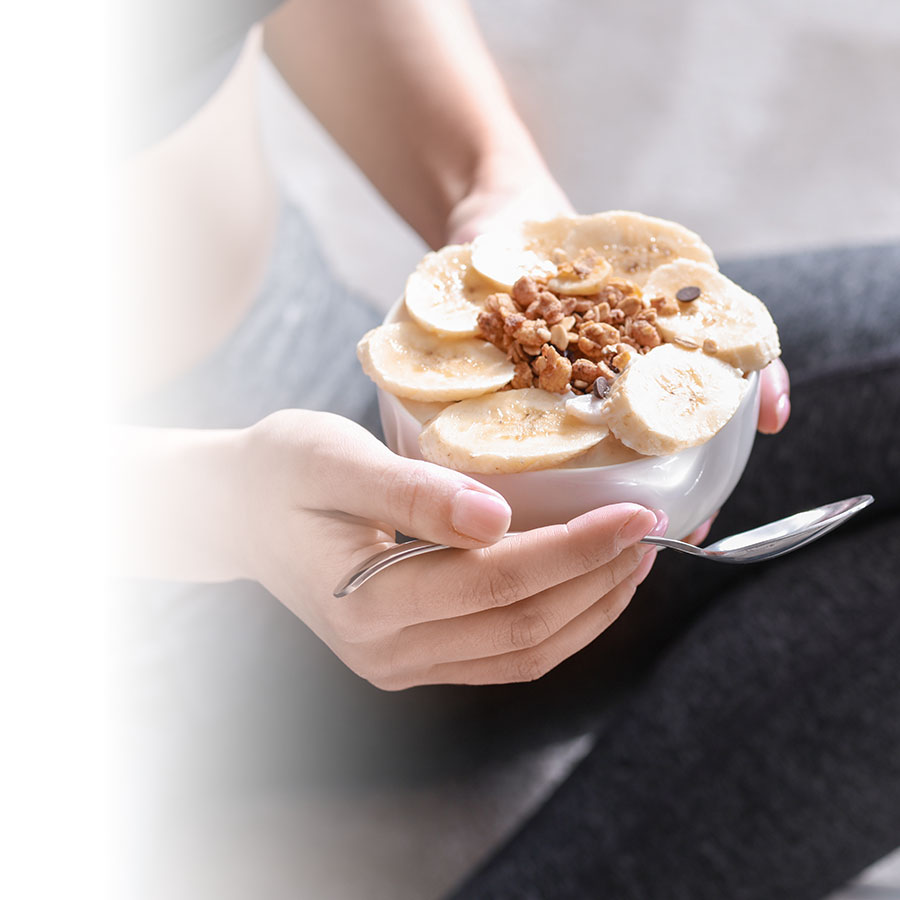An athlete’s performance will be altered if he/she doesn’t eat an appropriate amount of the right nutrients. Sports enthusiasts: learn to eat well.
Each food has a specific purpose in sports performance.
In the case of an athlete as for a sedentary person, each nutrient plays a role so the body can function optimally.
Protein: builds, repairs and helps immune function. It can be found in foods such as meat, nuts and cheese.
Carbohydrates: primary source of energy. They can be found in foods such as fruits, bread, grains, milk and yogurt.
Lipids: secondary source of energy, carry vitamins, form hormones. Lipids can be found in various foods such as oils and nuts.
Vitamins and minerals: essential to the body’s proper functioning. Vitamins can be found in foods such as fruits and vegetables.
The required amount of nutrients to eat varies from one person to another depending on several factors. For instance, the amount of recommended protein can differ according to weight, but also to the type of sport that is practised. A sedentary person’s needs will be different from those of an athlete who trains for the Olympic Games. The amount of carbohydrates generally varies according to volume (the duration of exercise) and the intensity of training.
What should you eat before doing physical activity?
The type of meal that should be eaten before physical activity varies according to the amount of time you have before exertion. The less time you have before exertion, the smaller the snack or meal will be, whereas the percentage of sugar (carbohydrates) will need to be greater.
If you have three to four hours before practising a sport:
Eat a meal that provides carbohydrates, a moderate amount of protein and lipids. In simpler terms, a plate containing equal shares of vegetables, meat, and grains would be a winning strategy.
If you have two hours before practising a sport:
Eat a meal that provides essentially carbohydrates and a little protein and lipids. In this situation, porridge with fresh fruit, a handful of nuts and a small serving of low-fat cheese could be an interesting option.
If you have 60 to 90 minutes before practising a sport:
Opt for a meal mainly providing carbohydrates, a little protein, lipids and fibre. No-fat yogurt accompanied with a fruit is a good snack choice.
If you have less than 60 minutes before practising a sport:
Choose a light snack containing only carbohydrates. A fruit would be the ideal option.
Note that it’s better to avoid foods that are high in fibre and fat such as avocados, nuts, legumes or processed foods before exertion.
What should you eat during physical activity?
If physical activity is under one hour:
You can choose to drink plenty of water during exertion.
If physical activity lasts more than an hour:
If it’s a moderate to high intensity workout, eating carbohydrates is important during the first hour of training. It is necessary to add a snack equal to 1 g per kg of body weight. The type of carbohydrates you choose is important. Some carbohydrates are absorbed faster than others, providing your body with the energy it needs to perform, more quickly. For instance, dried fruit, popcorn (natural of course) and even gumdrops are good options.
Hydration is also a determining factor of performance. It could even be advised to have a sugary drink during exertion. Drinking 125 to 250 ml of a beverage containing 6 to 8 g of carbohydrates, 50 to 70 mg of sodium, and 8 to 20 mg of potassium per 100 ml every 15 minutes would be ideal to ensure proper hydration and to store energy.
Home-made tip: Mix 750 ml of grape juice with a pinch of salt and 1.25 L of water to obtain a drink with 6% of carbohydrates, which meets the recommendations mentioned above.
What should you eat after doing physical activity?
Recovery and nutrition after exertion are essential. You can read the following article to learn more: Adequately recovering after physical exertion
These general tips are meant to help you. However, don’t hesitate to ask the advice of a kinesiologist or a nutritionist to learn more about your specific needs.

